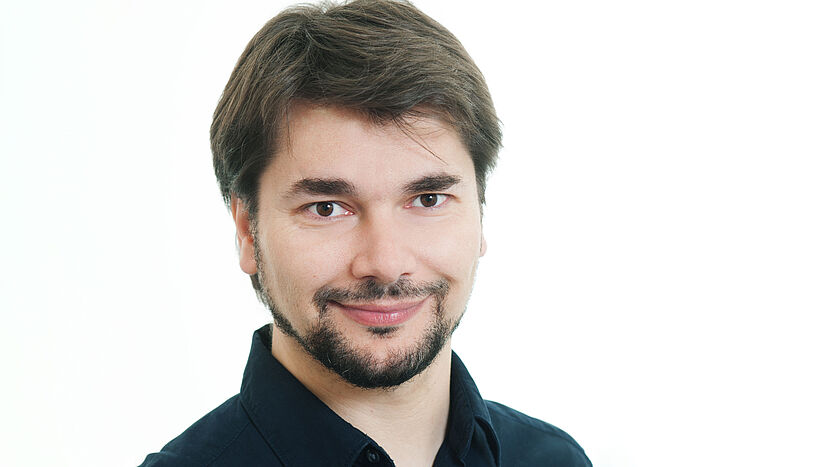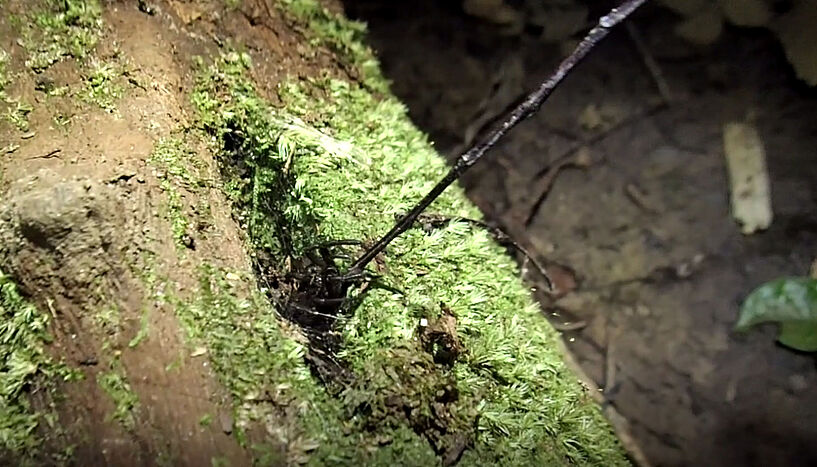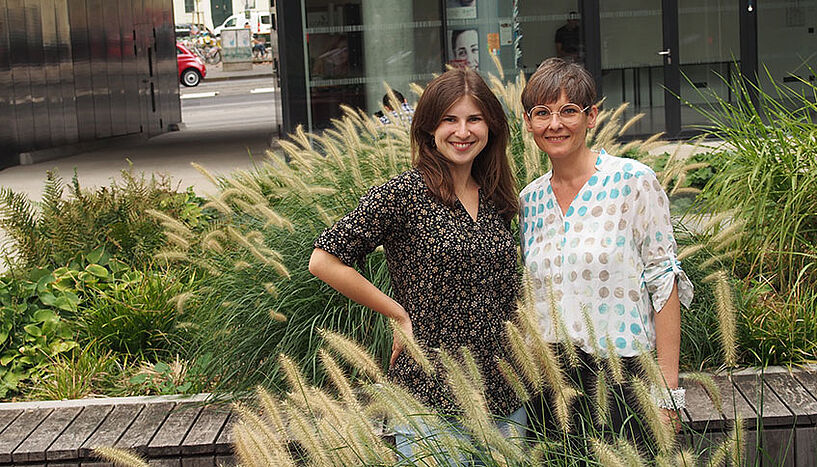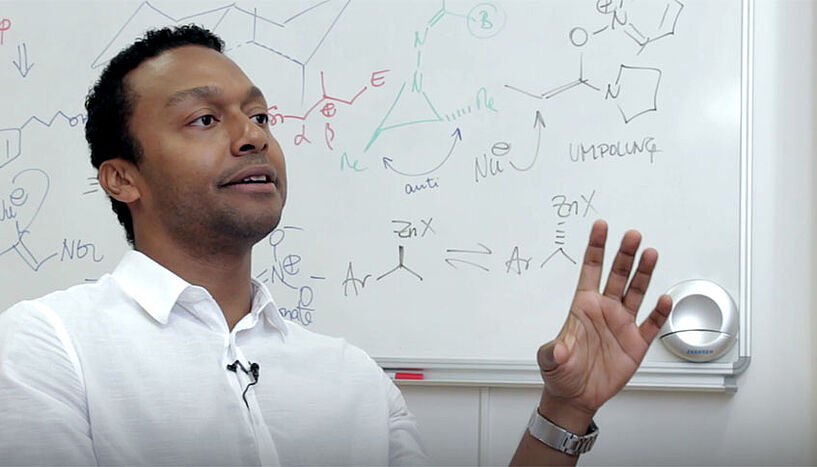Freddy Kleitz: "Vienna is a perfect place"
| 25. September 2019
Freddy Kleitz believes that it is important to stimulate the scientific curiosity of the students and broaden their horizons. (© Universität Wien/Barbara Mair)
In June 2016, Freddy Kleitz was appointed to professor at the Faculty of Chemistry of the University of Vienna. In the following interview, he explains why Vienna is the perfect place for him personally as well as for his scientific work.
uni:view: Your academic career brought you to France, Germany, South Korea and Canada. What are the benefits for you coming to the University of Vienna?
Freddy Kleitz: At this certain point of my career and life, I was looking for two important things. First, I wished to find an environment where our research activities could be fostered further with the adequate infrastructure and support. For this, the University of Vienna and its Faculty of Chemistry offered an ideal environment for promoting my research under excellent conditions. Second, after years of travelling and being far from home, I wanted to settle in a place with a high quality of life in a more familiar setting in Europe, closer to where I originally come from (Alsace, France). Vienna is a perfect place, for me and my family.
uni:view: Your research interests lie in the design of functional nanoporous materials and exploring their properties. Can you explain this in more detail?
Kleitz: We work with applied materials, so finding uses for the new porous materials we develop in our laboratory is a central objective. For instance, we are trying to make new catalysts for better chemical conversion and energy storage applications, new adsorbents for the efficient separation of pollutants, critical raw materials or biomolecules and smart nanocarriers for improved targeted therapies. Clearly, we have to make something useful and usable (hence the word "functional"). Nevertheless, although innovations are our goal, I also find it particularly important to contribute to the fundamental knowledge in chemistry and materials science. We strive for an improved understanding, new methods and concepts, and new ideas. However, none of this would be possible without properly training our students who are the future of research.
uni:view: What are you working on at the moment?
Kleitz: At the moment we develop a series of inorganic nanoporous materials, which we can structure and functionalise to use as nanocarriers for improved targeted drug delivery. Using such nanoporous particles as carriers, nonspecific toxicity and side effects of drugs, especially in chemotherapy, may be reduced and drug molecules could be transported into the body more effectively. Also, many new therapeutic drugs are difficult to administer directly to patients due to their degradability in biological media and low bioavailability. Owing to their porosity, porous silica nanoparticles offer the possibility of transporting large quantities of drugs into organs via targeting methods, through intravenous or oral delivery, and improve their bioavailability.
Freddy Kleitz's inaugural lecture "Materials with nanometer-size pores: New opportunities for healthcare and sustainable technologies" (Invitation to the inaugural lecture) takes place on 30 September 2019 at 13:30 in the Carl Auer von Welsbach-Hörsaal, Faculty of Chemistry, University of Vienna, Währinger Strasse 42, 1090 Vienna. The inaugural lecture is part of the dies facultatis 2019 at the Faculty of Chemistry. Programme (PDF)
However, the main challenge for targeted delivery remains the design of optimal carriers that could more specifically bind to and accumulate in the targeted organs or tissues (e.g. tumors). To achieve this goal, particle size and surface chemistry of the carriers must be carefully balanced and controlled. To do so, we work a lot with silica (SiO2)-based compositions which we can structure as well-calibrated sub-micron size particles and modify with environment-sensitive macromolecules and targeting species. The resulting particles can then serve as host for various therapeutic agents, a little depending on their pore size. Their biological and therapeutic performance is usually tested in collaboration with experts in biology and medicine.
Another of our activities is the design and production of selective organic-inorganic hybrid adsorbents for the separation and purification of critical raw materials, such as rare earth elements, which are used widely in advanced technologies, from their mineral sources but also from mining waste and end-of-life electronics or magnets. There is a global and critical need for greener methods in this area and, overall, recycling remains underdeveloped. Therefore, new methods and new materials are required. Nanoporous materials are ideal candidates to produce the needed adsorbents and sold-phase extraction systems.
uni:view: Let us talk about teaching. What is important for you in teaching your students?
Kleitz: I believe it is important to stimulate the scientific curiosity of the students and broaden their horizons in terms of knowledge and interest. Although the acquisition of fundamental knowledge remains essential, I really encourage students to try and think "outside the box". When I work with students, I try to inspire them to develop independent thinking and autonomy, hoping also to convey my enthusiasm to them. I think I give them a lot of freedom and the possibility to primarily pursue their own ideas.
uni:view: Your inaugural lecture takes place at the dies facultatis 2019 of Chemistry. What are you going to talk about?
Kleitz: The lecture will first introduce what nanoporous materials are and what makes them so exciting. I will show how these beautiful structures are prepared and characterised and, giving some specific examples, why they are quite promising solutions in areas as diverse as green chemistry, environmental remediation, separation technologies, energy storage and healthcare.
uni:view: Research, teaching, Head of the Department of Inorganic Chemistry – sounds like a lot of work. How do you relax?
Kleitz: I spend most of my free time with my family. We have a 21-month-old boy who is full of energy and very curious. So now, I spend a lot of time playing. I also enjoy listening to music, watching old movies and, obviously, travelling around the world to discover new places and meet all kinds of people.
uni:view: Thank you for the interview. (td)
Downloads:
Programm_AV_Kleitz_Freddy_final.pdf
Dateigröße: 169,63 KB



